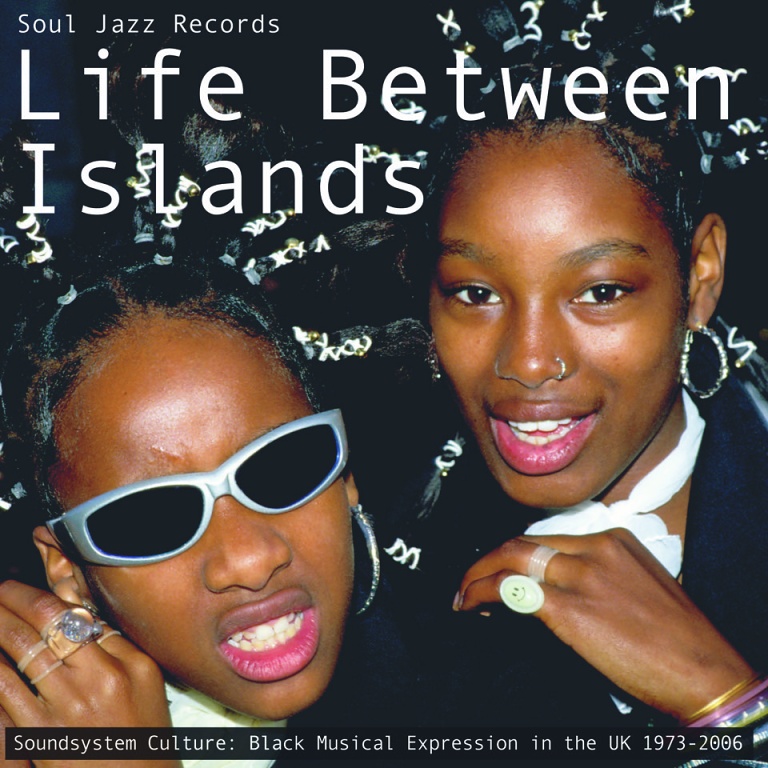A definitive collection of the Black Musical Experience in the UK expertly compiled by Soul Jazz
UK music and especially bass-informed music owes a great debt to its Caribbean inheritance. Cultural traditions and specifically music is so much richer on the British isles for the contributions of its Black communities, and largely communities originally from West Indian descent. Its history is intertwined with the UK’s bass music traditions and permeates through everything from Punk Rock to Dubstep.
Fragmented through the muddied histories of both music and politics, it runs the gamut from the Dub soundsystems of Nottinghill Carnival to the sounds of Jungle. There’s no one distinct sound, genre or style underpinning it all, and yet Soul Jazz has taken on the monumental task of compiling it all across 3 discs for Life Between Islands (Soundsystem Culture: Black Musical Expression in the UK 1973 – 2006).
Soul Jazz compilations are never anything but a carefully considered curation around a theme, and even with a theme this sprawling they manage to capture a definitive spirit across musical styles, genres and generations. Soundsystem culture in the UK is well documented, but never before has it been collated in such a sprawling document. The image of those Dub grandmasters handling their records like prized porcelain are still there, but it extends beyond them right up to an artist like Mala, who demonstrates the same kind of respect for the music, but in his case it’s not the hallowed grounds of Ska Rock, Lovers Rock or Reggae, but rather Dubstep.
What’s unique in the UK’s case as opposed to the USA, where this culture also infiltrated block parties and eventually Hip Hop, is that in the UK both the contemporary and the roots of the culture still co-exists today. One hasn’t supplanted the other like in Hip Hop’s case, but from the soundsystem selector to the Pop artist to the Club DJ all these exist congruously, and this compilation reflects that perfectly.
There’s a discontinuity in the chronological order and it’s so much richer for it. We can go from the soul-crooning Lovers Rock of Trevor Hartley’s “It must be love” to the bass-destroying jungle of “Java Bass” from Shut Up And Dance. Things don’t get out of shape, but flow serenely from one to the other. It’s not just the flow between genres and generations, but the incongruity between their musical station. You hear a track like stone-cold classic “Still in Love” (Janet Kay and Alton Ellis) sharing a compilation with Digital Mystikz (Mala) while elsewhere familiar classics like Winston Curtis’ “Be thankful for what you got” is only as strong as an underground classic from Pebbles.
We hear both artists and tracks at the pinnacle of their styles, while at others like the Ragga Twins we hear the sound of Jungle at its infancy. It’s still burgeoning where squirming synthesisers are trying to find their place amongst broken rhythms, but all those ingredients are there.
In the background there’s the question of the role that Black UK music and culture plays then and today; something that is often overlooked in contrast to their American counterparts. While everything from the Blues to Hip Hop has become ingrained in the social consciousness, the Black UK music experience is often conflated with broader UK music traditions. Portrayals of UK garage for instance have hardly focussed as much on the Black musical experience as its US counterpart, born from the Paradise Garage.
Like Drum and Bass, Jungle, Ska and Two Tone, it forms only part of a larger part of a cultural UK tapestry. It’s the Clash influenced by Reggae, Aphex Twin incorporating elements of Jungle and Drum and Bass; and the whole post-dubstep movement. I doubt there’s any malice behind the intention but it’s a universal case. Compare the Black Lives Matter movement to the Windrush scandal or the level at which young black men in the UK are still treated by the police, and there’s definitely an inconsistency there.
The Windrush scandal is particularly prevalent in the chosen title of this record. It’s right there in the title of the compilation (what is a life between two Islands if it’s not on a boat) and writ large in track titles like, and specifically like, “Don’t call us immigrants”. Life Between Islands poses the question; “would any of this amazing music have been possible if it weren’t for the first generation diaspora?” In the words of Winston Curtis, “Be Thankful for what you got,” because what have you really got in the UK without this great vital cultural input… morris dancing?
It’s curious that the compilation stops at 2006, suggesting either a second part, or the fact that anything past 2006 hasn’t been quite inducted yet in history yet. Will we eventually move into UK Garage or Grime from that point, or do the connections get more conflated, more diluted from those soundsystem origins. Perhaps at the end of the day this is just a fork in the road. From here, the listener can cut their own path, going into niche musical directions, or they can form new connections between musical worlds formerly tenuous grasped in what is an ultimate Black musical experience in the UK.

